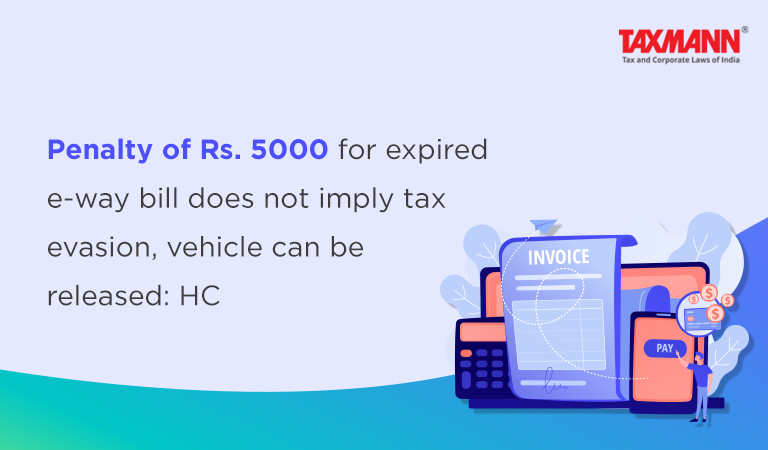Penalty of Rs. 5000 for expired e-way bill does not imply tax evasion, vehicle can be released: HC
- Blog|News|GST & Customs|
- < 1 minute
- By Taxmann
- |
- Last Updated on 16 February, 2023

Case Details: Tvl.Thiruvannamalaiyar Transport v. Deputy State Tax Officer - [2023] 147 taxmann.com 213 (Madras)
Judiciary and Counsel Details
-
- M. Sundar, J.
- B. Raveendran for the Petitioner.
- T.N.C. Kaushik, Adv. for the Respondent.
Facts of the Case
The truck of the petitioner was intercepted by the department and it was detained on the ground that e-way bill was expired. It filed writ petition against the detention of vehicle and goods by contending that there was break down of truck and extension of e-way bill could not be done since portal was blocked.
High Court Held
The Honorable High Court noted that as per facts and circumstances of the case, there would have been no revenue loss to the State if the truck had reached the destination without being intercepted since expiry of e-way bill would not create any scope for evasion. However, as per Circular No. 10/2019 dated 31.05.2019, penalty of Rs.5000 to be levied on expiry of e-way bill if there would be no tax evasion. Thus, it was held that the impugned proceeding was to be set aside and the petitioner was directed to pay Rs.5000 as penalty.
Disclaimer: The content/information published on the website is only for general information of the user and shall not be construed as legal advice. While the Taxmann has exercised reasonable efforts to ensure the veracity of information/content published, Taxmann shall be under no liability in any manner whatsoever for incorrect information, if any.

Taxmann Publications has a dedicated in-house Research & Editorial Team. This team consists of a team of Chartered Accountants, Company Secretaries, and Lawyers. This team works under the guidance and supervision of editor-in-chief Mr Rakesh Bhargava.
The Research and Editorial Team is responsible for developing reliable and accurate content for the readers. The team follows the six-sigma approach to achieve the benchmark of zero error in its publications and research platforms. The team ensures that the following publication guidelines are thoroughly followed while developing the content:
- The statutory material is obtained only from the authorized and reliable sources
- All the latest developments in the judicial and legislative fields are covered
- Prepare the analytical write-ups on current, controversial, and important issues to help the readers to understand the concept and its implications
- Every content published by Taxmann is complete, accurate and lucid
- All evidence-based statements are supported with proper reference to Section, Circular No., Notification No. or citations
- The golden rules of grammar, style and consistency are thoroughly followed
- Font and size that’s easy to read and remain consistent across all imprint and digital publications are applied



 CA | CS | CMA
CA | CS | CMA
